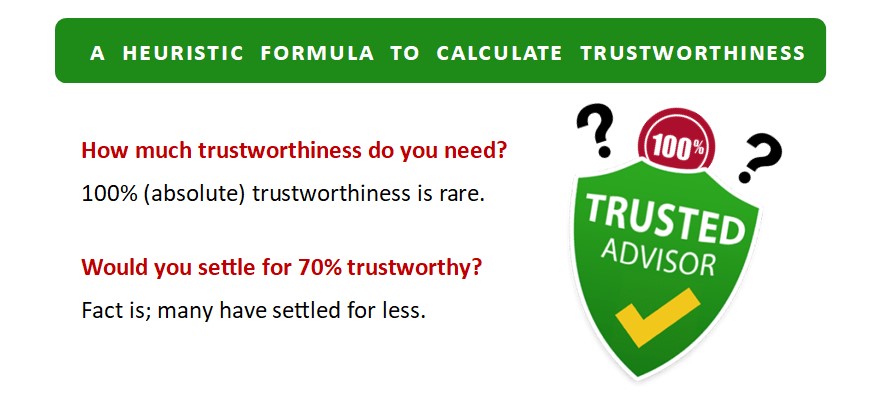A heuristic tool to assess an advisor’s trustworthiness
We often need trusted advisors to help us with our most pressing problems.
There are many types of advisors; personal advisors, business advisors, legal advisors, work-life advisors and so on – in fact the list of advisors seems almost endless.
Advisors are the people who you must trust for guidance and to act in your best interests
An adviser or advisor is normally a person with more and deeper knowledge in a specific area and usually also includes persons with cross-functional and multidisciplinary expertise. An adviser’s role is that of a mentor or guide and differs categorically from that of a task-specific consultant. An adviser is typically part of the leadership, whereas consultants fulfill functional roles. ( Wikipedia )
How to assess if person you want to deal is trustworthy
It’s important to choose an advisor correctly, because if your advisor steers you in the wrong direction, it could have overwhelming or devastating consequences.
When assessing a potential or current advisor’s trustworthiness, use this formula.
Apply it when evaluating an advisor offering services related to the financial, legal and regulatory aspects of your dental practice and professional life.
The Trustworthiness Formula

Where:
CREDIBILITY – the quality of a person being believed in. (Use a scale 1 to 3 – poor, satisfactory, excellent)
- Is the advisor a logical and clear communicator?
- Does the advisor have strong knowledge and credentials?
RELIABILITY – the quality of a person performing dependably. (Use a scale 1 to 3 – poor, satisfactory, excellent)
- Can the advisor deliver results?
- Can they provide compelling examples of their work?
DISCRETION – the quality of a person’s good judgement and discrimination. (Use a scale 1 to 3 – poor, satisfactory, excellent)
- Does the advisor to ask the “right questions” instead of asking questions that seem to come from a checklist?
- Is your relationship with the advisor one-on-one and personal, or one-on-many and less personal?
SELF-ORIENTATION – the quality of a person’s self-focus. (Use a scale 1 to 3 – poor, satisfactory, excellent)
- Does the advisor appear to be wedded to a particular outcome or seem less interested in your needs than you would like?
- Does the advisor appear inflexible with addressing your basic concerns or uncomfortable with changing agendas or objectives?
Scoring
This is a heuristic formula; so use it accordingly.
When scored nominally, the results are;
Score 3 = 100% trustworthiness
Score 2 = 66% trustworthiness
Score 1 = 33% trustworthiness
Using this example, a cut-off of 2.4 (or 80%) is probably okay, but consider a higher score if possible.
Remember, this is a heuristic tool.
Use it as a guide to qualitatively assess what you already know from experience.
That is, the more self centered a person is, the less trustworthy they become and as such, they may not always act in our best interest.

